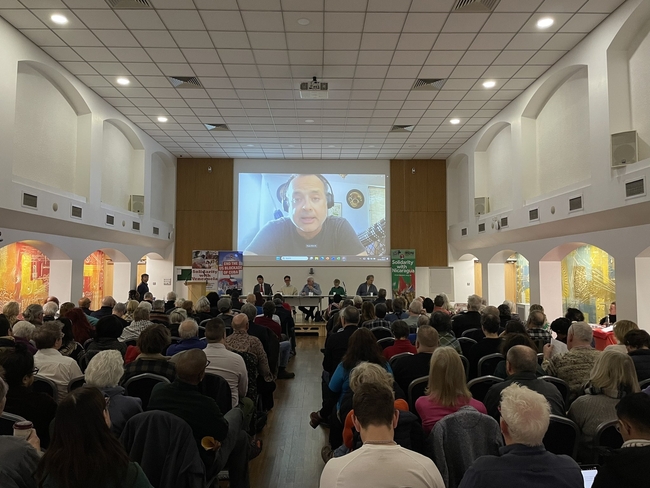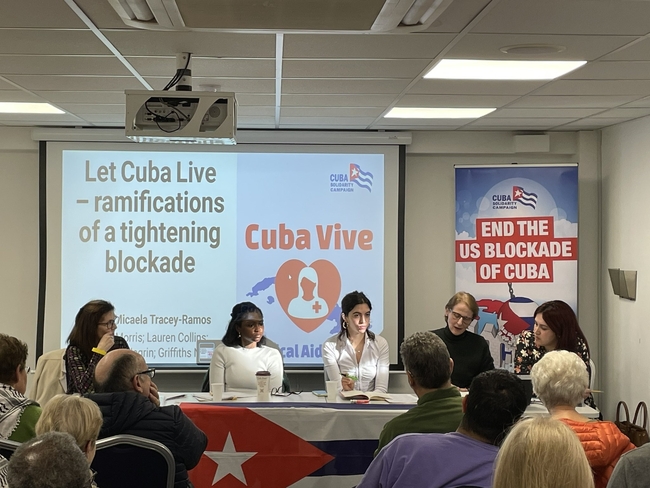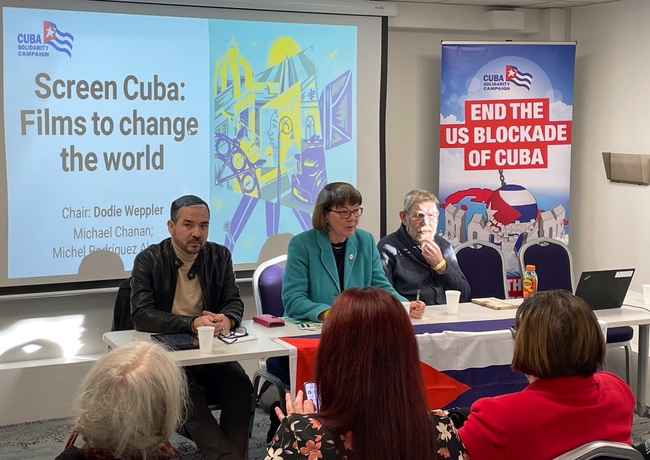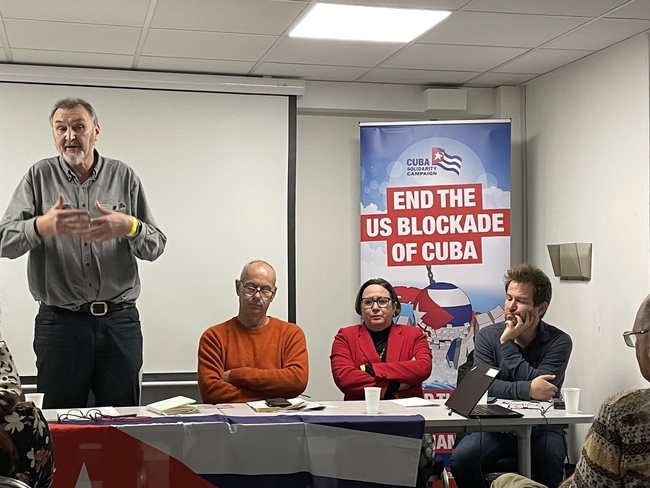"The world of the imperialists is dying" - Latin America Conference 2024
Campaign News | Wednesday, 31 January 2024

Vijay Prashad addressing the crowd at Hamilton House
In an era of increasing global uncertainty and overlapping crises, Latin America continues to show that building a better world is possible. In recent years, the continent has shifted decisively to the left, with progressive governments being elected in Brazil, Bolivia, Mexico, Honduras and even Colombia, once the bastion of US-backed reactionary regimes. Cuba, Venezuela and Nicaragua continue to resist the blockades, sanctions and regime change efforts in the face of increasing adversity.
Nearly 300 activists and trade unionists from across the country and further afield gathered at the home of the National Education Union (NEU), Hamilton House in Central London, to hear about the latest developments in the region and take inspiration from the numerous mass movements, struggles for sovereignty and resistance to neoliberalism that have come to define Latin America.
Opening plenary
National Secretary of the Cuba Solidarity Campaign (CSC), Bernard Regan, chaired the opening plenary and encouraged delegates to learn as much as possible about the struggles for progressive change across the region and to build international solidarity.
“The world is in a kind of churning right now. Things are moving, things are changing.” Vijay Prashad, director of the Tricontinental Institute for Social Research, joined us via video and opened the conference setting out the global context of huge social, economic and political change. “The world of the imperialists is dying”, he said. “But an alternative world is yet to be born.” In this struggle to give birth to a new world, Prashad placed Cuba at its heart. “If the imperialist countries are successful in overthrowing the Cuban Revolution, our efforts to build a better world will be dealt a major blow.”
Counsellor of the Venezuelan Embassy, Maria Ceclia Toro, looked ahead to an important year in which the country’s struggle against sanctions continues. "The Bolivarian Revolution was born from the peoples’ votes in free elections and once again we are getting ready for elections in 2024”, she told attendees.
In a period of devastating conflicts across the world, editor of the Morning Star, Ben Chacko counterposed the priorities of the imperialist countries of the global north to the progressive and socialist countries in Latin America, in particular Cuba. “Where Britain and the US export bombs, Cuba exports doctors” he told attendees. “Cuba proves every day that another world is possible, but in the twenty-first century the entire region is associated with that struggle.”
While Argentina’s left has suffered a huge setback following the election of far-right libertartian Javier Milei, the fight back has already started, with hundreds of thousands of Argentine workers taking part in a general strike in protest at Milei’s reforms. Gabriel Mocho Rodriguez of International Transport Workers' Federation told guests that international solidarity from unions and groups around the world was crucial for the strike and will be crucial in the weeks and months to come.
Closing the session, Kate Hudson of CND paid tribute to the Latin American governments that have been at the forefront of solidarity with the Palestinian people and have opposed Israel’s genocidal war. She placed Latin America at the heart of a changing world, noting that “while the global north loses economic power and increases militarisation, the global south is growing economically and demanding independence.”
Throughout the day more than 60 speakers took part in 22 seminars and film screenings, and delegates browsed stalls from solidarity campaigns, progressive organisations and publishers. Three packed seminars focused on Cuba.
Let Cuba Live – ramifications of a tightening blockade
62 years of the illegal US blockade, and no reversal in the policy of “maximum pressure” imposed by the Trump administration, are crippling Cuba’s post-COVID economic recovery and causing the most severe shortages seen on the island since the Special Period. In our first session of the day, the panel looked at the impact of a tightening blockade on Cuban society.
With the recent news that Cuba’s government has introduced a series of measures, including raising the price of fuel, in order to reduce its deficit, Emily Morris placed Cuba’s current economic crisis in the context detailed above. Emily made it clear there is no magic bullet, but things are changing and the Cubans “are slowing breaking the back of it”. Emily said that while the recent measures are full of contradictions that must be dealt with, the president, government and the unions are committed to it. While it is a difficult package, " there is full protection for the most vulnerable in society and the increase in efficiencies that they are seeking to achieve is an absolute priority.”
Lauren Collins explored Cuba’s attempts to tackle climate change, which the country remains committed to doing, regardless of the blockade. However, she highlighted how Cuba is unable to engage in much of the international collaboration vital to tackling what is a global issue. Speaking of how much money is available internationally to address climate change, she noted that less than a quarter of the money will go to Latin America, the Caribbean and Africa. Shockingly, Cuba is unable to access any of it. She stressed how ludicrous it was that, in a country blessed by the sun, there are only a few solar panels as transport problems or implementation costs cannot be met because of the blockade.
[More details of this session will follow.]
Screen Cuba: Films to change the world
Ahead of the UK Festival of Cuban Cinema taking place in London in March, our second panel of the day examined the rich history of Cuban film since the Revolution. Chairing the session, Dodie Weppler explained that, in the face of a concerted US-promoted campaign to fund groups and individuals working to undermine the cultural gains of the Revolution this will be more than just a selection of film screenings. She also revealed that proceeds of the festival would go towards the restoration and digitisation of classic films in Havana, in partnership with the Cuban Institute of Cinematographic Art and Industry (ICAIC), itself a partner in the festival.
Michel Rodriguez Alonso, First Secretary of Cultural, Academic and Scientific Affairs at the Cuban Embassy touched on the importance of culture, and cinema in particular, to the Cuban nation and its Revolution. Culture, Michel said, “was a pillar of the Revolution itself” from its earliest days, with Cuban cinema being of particular importance. “Cuban cinema was to the Cuban Revolution what muralism was to the Mexican revolution.” He noted that, just like the Cuban Revolution itself, ICAIC is celebrating its 65th anniversary this year, highlighting its importance as an institution.
Attendees were then treated to a whistle-stop tour of classic Cuban films since 1959 from Michael Chanan, Professor of Film & Video at Roehampton University, London and expert in Cuban cinema. He argued that, unlike their counterparts in the Soviet Union at points throughout its history, there were no state controls on artistic style in Cuban film-making. From Memorias del Subdesarollo (Memories of Underdevelopment) to Fresa y Chocolate (Strawberry and Chocolate), Chanan charted the development of the industry and how Cuban films were both influenced by the Revolution and themselves had a significant impact on Cuban society, helping to shape the modern, revolutionary nation we see today.
‘Screen Cuba: Films to change the world’ will take place at the Garden Cinema in London, from 9 – 22 March.
Off the List – Cuba is not a terrorist state!
It has been four years since Cuba was returned to the US ‘State Sponsor of Terrorism’ (SSOT) list, a decision that has had a devastating impact on Cuba’s economy. In our final session, the panel looked at why the US perseveres with such a designation, when Cuba is clearly not a sponsor of terrorism, exactly what the impact has been and how supporters can join with CSC’s campaign in demanding that Cuba is taken #OffTheList.
Outgoing Ambassador, Her Excellency Barbara Montalvo Alvarez, explained that Cuba’s hosting of internationally recognised peace talks between the Colombian government and ELN guerrillas in Havana lay at the heart of the spurious designation. “Inclusion on this list is a dishonest act, which harms, and causes suffering, to our people”, she said. She encouraged all in attendance to get involved with CSC’s campaign to get Cuba removed from the list, as to do so “is to be on the side of truth and justice.”
CSC Chair Kevin Courtney went on to emphasise the immediate impact this designation had on Cuba. “It prevents Cuba from using international banking systems and makes it increasingly difficult to acquire basic necessities such as fuel, food, medicines and hygiene products. Forty-five international banks immediately terminated relations with Cuba when it was returned to the list”, he told attendees. “The US is trying to bully the Cuban people into changing their system”, Kevin said. However, “we at CSC believe in the self determination of the Cuban people… that’s why you should sign our open letter to the US ambassador and join the international call to get Cuba off the list.”
Tracy Delaney and David McKnight, from UNISON North West, then officially launched the Cuba Vive Medical Aid Appeal. Following a UNISON North West delegation to Matanzas last year, Tracy and David recalled how they saw the real impact of the tightening blockade and Cuba’s inclusion on the SSOT list on Cuban medical and health services. Despite Cuba’s celebrated record on health, the country’s dedicated health professionals struggle with limited resources to treat patients. From surgical supplies to spare parts, paracetamol to sutures: items that are in plentiful supply in the UK, are increasingly hard to come by or cost up to three or four times more. That’s why, alongside CSC and UNISON Wales, Northern Ireland and Northern regions, they’ve launched this appeal to send containers of life-saving medicines, raw materials, surgical supplies and medical equipment to Cuba.
Closing the session, the MP for Islington North Jeremy Corbyn lauded Cuba’s internationalist efforts over the decades. “Wherever there’s a crisis in the world, it’s the Cuba’s who are there first”, he said. Paying tribute to the outgoing ambassador, Corbyn thanked her for all of her efforts over the past four years and for “helping to bring Cuba here to the UK.”
Final plenary
After a full day of seminars and films, the conference closed with the final plenary, chaired by Kevin Courtney, who emphasised the importance of the conference in building solidarity and inspiring hope.
President of the NEU, Emma Rose, celebrated her union’s commitment to international solidarity work, particularly in Latin America. Such work is “not just an add-on, but at the core of who we are”, she told the crowd, committing to continuing the union’s work on Cuba, Nicaragua, Colombia and others.
In what was her final public speech, Her Excellency Barbara Montalvo Alvarez, extended her solidarity to the Palestinian people. She told guests that the Latin America conference, throughout her time in the UK, has always been a special experience. Kevin Courtney paid tribute to her incredible commitment, presenting a farewell gift. "I take this opportunity to say goodbye. In a few days I return to Cuba. It has been an honour and a privilege to work with you. I say goodbye not as an Ambassador, but as a revolutionary woman", she closed, to a standing ovation.
Chair of the All-Party Parliamentary Group on Cuba and MP for Easington, Grahame Morris, lauded the day’s event as “another brilliant example of international solidarity and one which I know will inspire us all to keep going and indeed to do more.” He highlighted how the US is becoming increasingly isolated, as it adheres to policies of “intervention, aggression and domination”, nowhere more starkly than in Cuba.
Jess Barnard, who sits on Labour’s NEC, described the inspiration that she, and others on the left, can take from Cuba’s commitment to internationalism and achievements in social justice. She set out what the position of the labour movement towards the whole region in this country should be. “No to interventions, blockades and sanctions. Yes to unity, peace and socialist change.”
Closing the session, Jeremy Corbyn MP sent thanks to the Henry Reeve Medical Brigades and all Cuba’s medical workers taking part in missions overseas, who embody the Cuban internationalism which Jess spoke about. Highlighting Lula’s re-election in Brazil, Corbyn said that socialists and progressives can draw so much from the recent successes in the region. “ It was nothing to do with support from the media and financial institutions and everything to do with hope and popular organisation."
CSC and Latin America 2024 organisers would like to thank all the speakers, volunteers, delegates and supporting organisations who attended, especially the National Education Union, without whom the event would not have been possible.

CSC's first session on the tightening blockade

Looking ahead to 'Screen Cuba'

CSC Chair Kevin Courtney






